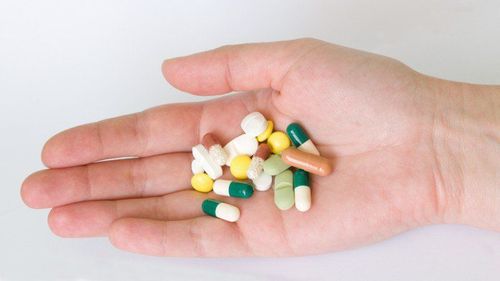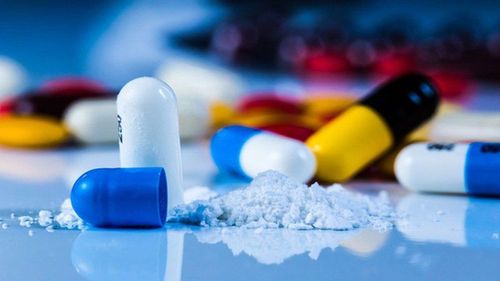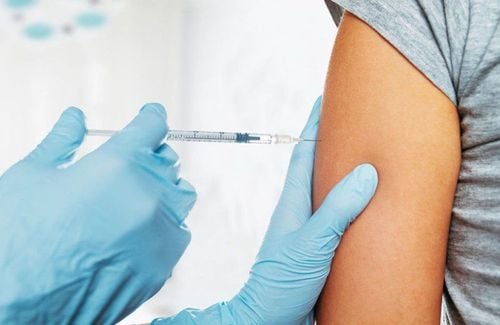This is an automatically translated article.
Thepacol 120 is an analgesic and antipyretic drug with the content of Paracetamol 120mg, the drug is prepared in the form of powder mixed with oral suspension, suitable for children.
1. Ingredients of Thepacol 120
The main ingredient of Thepacol 120 is Paracetamol, also known as Acetaminophen. Each Thepacol 120 tablet contains 120mg Paracetamol, along with excipients just enough 1.5g per tablet. Excipients of Thepacol include: white sugar, glucose, aspartame, hypromellose, povidon K30, orange flavor powder, sunset yellow color and colloidal anhydrous silica.Thepacol powder for oral suspension is yellow-orange, homogeneous, dry, and has an orange aroma. The eye-catching color and pleasant aroma of the drug are very suitable for young patients.
2. Pharmacokinetics of Thepacol (Paracetamol)
When taking Thepacol, Paracetamol will be absorbed almost completely quickly from the gastrointestinal tract. Several factors can reduce the rate of drug absorption such as foods rich in carbohydrates. Paracetamol plasma concentrations peak within about 30 to 60 minutes after oral administration of Thepacol in therapeutic doses.
Paracetamol will be rapidly and evenly distributed in most body tissues. The proportion of Paracetamol in the blood bound to plasma proteins is about 25%.
Paracetamol is converted to N-acetyl-benzoquinonimin, a highly reactive substance. N-acetyl-benzoquinonimin usually reacts with sulfhydryl groups in glutathione, so it is inactivated. But if overdose Paracetamol, a large amount of this intermediate will be formed, increasing the reaction with the sulfhydryl group in the protein of the liver, leading to liver necrosis.
Paracetamol is eliminated mainly in the urine in the form of metabolites. The half-life of Paracetamol is approximately 2.5 hours.
3. What are the uses of Thepacol 120?
3.1. Pharmacodynamics of Paracetamol Paracetamol, also known as Acetaminophen or N-acetyl-p-aminophenol, an active metabolite of phenacetin, has an effective analgesic and antipyretic effect that can replace aspirin. However, Paracetamol differs from aspirin in that Paracetamol is not effective in treating inflammation.
Paracetamol acts on the hypothalamus to reduce heat, increase heat loss through vasodilation and increase blood flow to the periphery. Therefore, paracetamol has the effect of lowering body temperature in febrile patients, but it rarely lowers body temperature in people with normal temperature.
Paracetamol only acts on cyclooxygenase/prostaglandin on the central nervous system, not on systemic cyclooxygenase. Therefore, Paracetamol used at therapeutic doses rarely affects the cardiovascular and respiratory system, and Paracetamol does not change the acid-base balance. The drug does not cause irritation, inflammation or stomach bleeding like salicylates.
Paracetamol has no effect on platelet aggregation or bleeding time.
Paracetamol overdose or sometimes the right dose of Paracetamol but in some susceptible people (malnutrition, alcoholism, drug interactions, genetic predisposition) can cause hepatotoxicity due to an increase in metabolites. N-acetyl-benzoquinonimin.
3.2. What are the indications for the treatment of Thepacol? With the characteristics of pharmacokinetics, pharmacodynamics as well as content and dosage form, Thepacol 120 is used to relieve pain and reduce fever from mild to moderate, suitable for children in the following cases:
Colds, flu. Dengue. Infection. Toothache. Sore throat. Headache . Pain due to trauma. After surgery.
4. Dosage and how to use Thepacol
4.1. Method of administration Thepacol 120 is administered orally after dissolving in 5ml of water and stirring to disperse evenly.
4.2. Dosage The doctor recommends that it is best to calculate the dose of Paracetamol according to the weight of the child to use the drug accurately and most effectively. The dose of Paracetamol calculated by weight is 10-15mg/kg. Thepacol should be given at least 4-6 hours apart, no more than 5 times a day, and no more than 75 mg/kg in 24 hours.
For the convenience of using Thepacol 120 for children at home, parents can refer to the manufacturer's recommended dose below:
Children under 1 year old: Take 1/2 pack/time. Children aged 1-2 years: Take 1 sachet/time. Children aged 2-3 years: Take 1.5 sachets/time. Children aged 4-5 years: Take 2 sachets/time. Or take Thepacol 120 as directed by your doctor.
Do not use Thepacol 120 for self-treatment for pain relief for more than 5 days in children, 10 days for adults, unless directed by a specialist, to avoid missing medical conditions that need to be diagnosed and treated promptly. time.
Do not use Thepacol for self-treatment of high fever (above 39 degrees Celsius) lasting more than 3 days, in children as well as adults, or recurrent fever, unless directed by a doctor as it may be indicative of a serious illness needs to be examined and detected quickly.
5. Side effects of Thepacol
5.1. Common side effects when using Thepacol (ADR >1/100) Nervous: Patients may experience headache, dizziness, thirst or strange sensations. Gastrointestinal: Nausea, vomiting and constipation. Urinary: Urinary retention and infrequent urination. Cardiovascular: Weakness, fatigue, fast or slow pulse, palpitations and orthostatic hypotension. 5.2. Uncommon side effects of Thepacol (1/1000 < ADR < 1/100) Skin: Skin rash occasionally occurs with Thepacol 120. Usually erythema or urticaria, with pruritus. Sometimes skin lesions are more severe, may be accompanied by fever due to medication or mucosal damage. Stomach - intestines: Nausea and vomiting. Hematology: Hematopoietic disorders, may experience leukopenia, neutropenia or pancytopenia. There may also be anemia. Kidney: Kidney disease, nephrotoxicity may occur with long-term use of Thepacol. Nervous: Respiratory depression, sedation, restlessness and euphoria. Gastrointestinal: Stomach pain or bile duct spasm. 5.3. Rare side effects of Thepacol (ADR < 1/1000) Skin: Serious skin reactions such as: Steven-Johnson syndrome, Lyell's syndrome toxic epidermal necrolysis,... can occur acutely. potentially fatal, but rare. If there are skin manifestations while using Thepacol, stop the drug immediately and notify the doctor. Other: Hypersensitivity reactions. In addition, overdose of Thepacol can cause severe liver damage, even necrosis.
If experiencing these symptoms, the patient should stop using Thepacol 120 and notify the doctor for appropriate treatment.
6. Contraindications of Thepacol
Contraindicated to use Thepacol 120 in the following cases:
Hypersensitivity to Paracetamol or any component of the drug. Severe liver failure.
7. Precautions and notes when using Thepacol
7.1. Subjects should be cautious when taking Thepacol. Patients with pre-existing anemia. People who drink a lot of alcohol. People with impaired liver or kidney function. People with phenylketonuria. Patients with glucose-galactose malabsorption. The patient has hereditary problems related to sucrase-isomaltase deficiency, fructose intolerance, glucose-galactose malabsorption. Patients prescribed high doses of Paracetamol should be closely monitored. 7.2. Recommendations for use in pregnancy and lactation Pregnancy: The safety of using Paracetamol during pregnancy has not been established, because it may affect the development of the fetus. Use only when absolutely necessary and prescribed by a doctor. Lactation: The use of paracetamol in lactating women has not shown an ADR in the nursing infant. 7.3. Effects of Paracetamol on work No adverse reactions have been recorded, nor have any studies on the effects of the drug on the ability to operate machinery, drive vehicles, and work at height.
7.4. Thepacol drug interactions Pay attention to the interactions of Thepacol as well as drugs containing Paracetamol with some drugs or foods:
Anticoagulants. Combination of phenothiazines and hypothermia. Drinking too much and too long. Anticonvulsants (phenytoin, barbiturates, carbamazepine). Probenecid . Colestyramine. Erythromycin, Domperidone and Metoclopramide. Above is all information about Thepacol 120, patients need to carefully read the instructions for use, consult a doctor / pharmacist before using. Absolutely do not arbitrarily buy Thepacol 120 for home treatment because there may be unwanted side effects.













